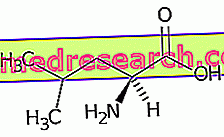Metabolic Role
Leucine is an essential amino acid because the human body, not being able to synthesize it, needs its constant contribution through the diet. Like all amino acids, leucine is contained above all in protein foods of animal origin but, unlike others, it is also well represented in legumes and cereals.

From the chemical point of view it is an apolar amino acid with a branched structure (its lateral group is an isobutyl).
Together with two other essential amino acids, called isoleucine and valine, it forms an amino acid pool particularly used in the sports field, where it is known with the acronym BCAA (brain chain aminoacids or branched chain amino acids).
Leucine supplements
Leucine, valine and isoleucine make up about 20% of the amino acids taken from the diet and are particularly concentrated in the muscles. In healthy people, an increased demand, such as to require an integration, is justifiable only in cases of intense sporting activity. The branched amino acids are in fact an important source of alternative energy, to which the organism is important only during very intense and prolonged efforts (in normal conditions it would have no reason to consume its muscles, whose function is not energy but structural ).
There are essentially two categories to which the products based on leucine, isoleucine and valine are addressed:
resistance athletes (cyclists, marathon runners, cross-country skiers etc.). These supplements are taken to accelerate recovery and limit muscle loss (catabolism), the perception of fatigue and tolerance to lactic acid
Bodybuilders / bodybuilders, this time the BCAAs are taken with the primary purpose of maximizing protein synthesis to increase muscle mass.
Sometimes they are also recommended for vegetarians and those who follow particularly restrictive weight-loss diets (in order to limit the loss of muscle mass and the consequent drop in metabolism).
To ensure the body an adequate supply of leucine, BCAAs should be taken within 30-60 minutes prior to intense physical activity (endurance athletes) and within an hour of the end of the effort (boybuilders and endurance athletes). As an alternative to branched amino acid supplements, it is possible to consume a low-fat protein snack (bars, low-fat yogurt, chicken meat, cottage cheese or a protein shake) immediately after exertion.
As an alternative to leucine, many athletes resort to the integration of one of its metabolites, HMB (hydroxy methyl butyrate), with promising potential as an adjunct to muscle development.



